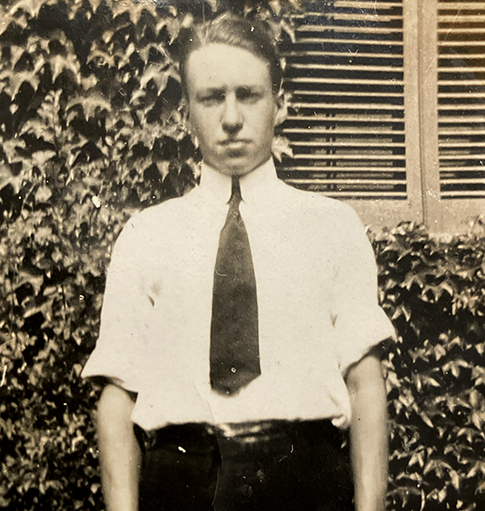
The Piano Player
In The Mending, Jessie’s cousin John, a handsome, though somewhat shy twenty-nine year old, is an accomplished pianist. His talents at the keys at one tea dance after another propel guests to fox trot though many a parlour. An illicit drink at the ready and surrounded by a surplus of unmarried women, those gigs are livelier than those undertaken a decade earlier. In those first years of the war--a teenager, too young to enlist--John earned his pocket money playing the musical score to the silent movies shown at the Capitol Theatre.
The fictional cousin John in my Beneath the Alders series was inspired by my real life grandfather, Jim. I am not sure if he ever played the piano at tea dances but he certainly was among the most knowledgeable teenagers in Brampton when it came to silent movies where he often played the piano next to the big screen.

Silent movies, it seems were not all that silent. However the sounds supplied to the audience did not emit from the actors but rather from two other sources. The first was music. Nearly all movie houses arranged some form of music to accompany the films. At a minimum, there was a piano. But some theatres had organs. Some had full symphonies. It was recognized that music was necessary to create the atmosphere for a scene and to provide “emotional cues” to the audience. A theatrical organ could produce many of the sounds we hear in movies today including car horns, train whistles, horses hooves, telephone rings, thunder and rain. In the late 1920s, at the height of the silent movie era, work in movie theatres was the largest source of employment for American musicians. The advent of “talkies” took a great toll on their livelihood.
The musicians played scores that were provided to them or arrangements of their own choice. The latter sometimes revelated an inability on the part of the player to read music, This was the case it seems for Harpo Marx who had an early but short-lived career as a film pianist. He only knew two songs and their repetition irritated the audience to such an extent that he was driven from that position. He clearly moved onto better things.

The second sound supplied was voice—no, the pianist was not expected to sing to the music. Rather, the musician sometimes read. What they read were the “intertitles”. I was stumped on that. What was an intertitle? An intertitle are words written on a blank card, photographed and spliced into a film. They are shown between scenes. They may say something like “the next day” or they could even communicate small bits of dialogue. We still see words like this today but often they appear on the screen during the scene. My screen writer daughter Maxine, says these are called chyrons.

An Intertitle
We also see text at the bottom of our theatre and personal screens. Initially, these words translated the foreign language of the actors, but now many of us with some hearing impairment display these words at all times! We call them subtitles. As I researched the meaning of intertitles, I began to wonder why we call these words subtitles?
Yes, I understand that “sub” means below in Latin and the words appear below or at the bottom of our screens (unless we are watching a show on an iphone in which case they sometimes appear at the top, but that is another matter). I got thinking about the translated words provided at an opera. They are displayed above the stage and so are often referred to as “surtitles”--sur meaning above in Latin. So I get the above and below parts. But why is the translation of dialogue called a title? Google was not able to provide a satisfactory answer.
On the subject of etymology, I learned another new word in this research: retronym. A retronym describes a term created to retroactively distinguish something from later developments. A good example of this is the term silent movies. Before talking movies were created in the late 1920s, movies were just called movies. It was only after talking movies were created that those that preceded them became known as silent movies.
It makes me think that we may soon have another example of a retronym. Sometime in the future when more cars are electric we will need a phrase to describe those that preceded them. Cars that had internal combustion engines is a mouthful. Some day these may just be referred to as “gas cars”. You heard it here first.


To Order Your Copies
of Lynne Golding's Beneath the Alders Series

